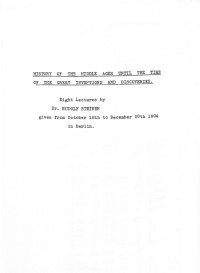History of the Middle Ages
GA 51

The transcript of these lectures on the history of the Middle Ages, given by Rudolf Steiner at the Workers' Educational Association in Berlin, faithfully and accurately reflects their content, albeit in somewhat condensed form. The lectures show how Dr. Steiner wanted history to be approached, and thus form the prelude to what can be seen as a new science of history in his complete works. Their intellectual scope, which draws the underlying causes of earthly events from deeper sources than we are accustomed to, is already evident in this condensed overview of widely scattered historical events. These freely spoken lectures were inserted into what emerged as the soul configuration in the circles of the working class; they addressed what the listeners could follow with understanding thanks to their well-trained and alert intelligence. But they did not serve any party program; rather, they opposed the dogma of a materialistic view of history in the most eminent sense. As a result, they were denounced by the leading figures there, who demanded not freedom but, as they put it, “reasonable coercion”! This led to Rudolf Steiner being removed from his teaching position at the workers' educational school, despite the general support of the audience for its continuation. Many letters from workers who had recognized how Rudolf Steiner had wanted to serve them were interesting: they expressed their gratitude that someone had finally come who trusted them to have interests other than the struggle for bread, who had spoken to them from the spirit, assuming that they too had such aspirations and thus appealing to their best qualities.
We are indebted to Miss Johanna Mücke for transcribing these lectures.
—from the Foreword by Marie Steiner to the first edition, 1936
| I. | Celts, Teutons, and Slavs | October 18, 1904 |
| II. | Persians, Franks, and Goths | October 25, 1904 |
| III. | The Impact of the Huns on the Germans | November 01, 1904 |
| IV. | Arabic Influence in Europe | November 08, 1904 |
| V. | Charlemagne and the Church | November 15, 1904 |
| VI. | Culture of the Middle Ages | December 06, 1904 |
| VII. | France and Germany | December 13, 1904 |
| VIII. | From the Middle Ages to the Renaissance | December 20, 1904 |
| IX. | The Emergence of Cities | December 28, 1904 |
| X. | The Rise of Science | December 29, 1904 |

